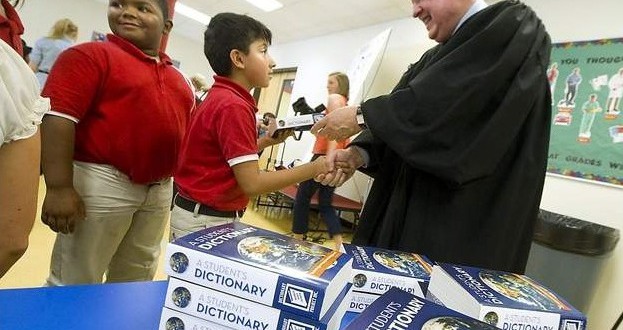A gift of knowledge: Local woman donates dictionaries to Harmony third graders
Floy Poe asked a third-grade class to tell her the longest word in the dictionary.
Among the students’ responses were “Mississippi,” “dictionary,” “chemistry” and, of course, “supercalifragilisticexpialidocious.”
Poe said each student would leave Harmony Science Academy in Bryan that day with the tool to help them discover that answer and much more.
Poe, 79, donated 56 dictionaries to the third graders after spending time walking door-to-door collecting money in her neighborhood for the project.
Eight-year-old Parker said she was excited because she didn’t have a dictionary at home and joined the class in burying her nose in the book as soon as it was handed out.
“It’s exciting, and I know if I need to spell a word now I can just look in the dictionary,” she said while holding the book tight against her chest.
Poe moved to the area in 2009 after living in Ellis County, where she participated with other residents in the The Dictionary Project, a South Carolina-based nonprofit initiative. The program aims to help students develop as good writers, active readers, creative thinkers and resourceful learners by providing them with their own dictionaries. Sponsors can contact the organization and receive the books for a donation to distribute to children.
Poe likes the organization’s dictionary because it contains more than just the spelling and definition of words and includes the history of the U.S. flag, a list of all the presidents, maps, information on planets and other helpful knowledge.
Candice McInnis, third-grade math and science teacher, said she thought the donation was a wonderful gift for the children and was glad the school could be a part of it.
“We try to promote literacy in and out of the classroom every single day, and I think this is a step toward that,” McInnis said. “I hope neighborhoods across Brazos Valley can pick up their neighborhood school, pick up the program and support their local students.”
Poe brought special guests to speak to the students.
Dr. Chase Lindsey, a local chiropractor, encouraged the children to look up the word ‘integrity’ when they got home.
“Shortly, it means honesty,” Lindsey said. “That’s what this dictionary can actually help you be: honest. In today’s society, anything you say or write, chances are it’s recorded. You want to make sure that you know exactly what you’re saying or what you’re writing. Because at some point somebody’s going to look at that, and you better make sure that you’re right.”
Judge Steve Smith asked how many of the students used spell check on a computer, a question that was met by a flurry of eager hands being raised.
“That’s a wonderful thing except it doesn’t do all the job. That’s why it’s so important to know how words are spelled,” Smith said.
Smith used the example of “too” and “two” and “accept” and “except.” He said it’s important to learn to use a dictionary because a spell-check program won’t realize the wrong word has been used in a sentence.
“That’s the wonderful thing about a dictionary. You can go through a dictionary and learn words and learn how they’re spelled. But more importantly you learn what they mean … Use your dictionary and you will open your mind to things you’ve never learned before,” Smith said.






